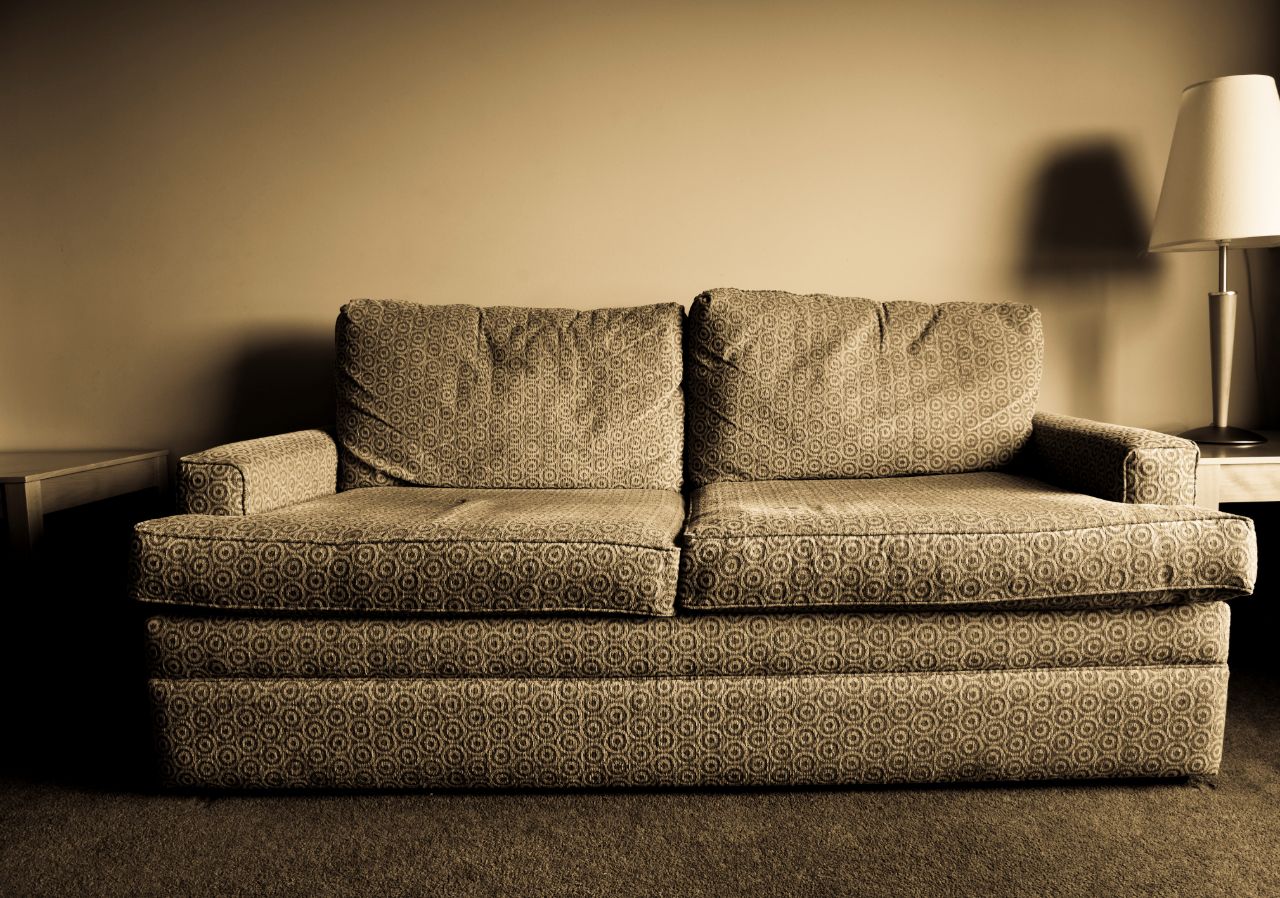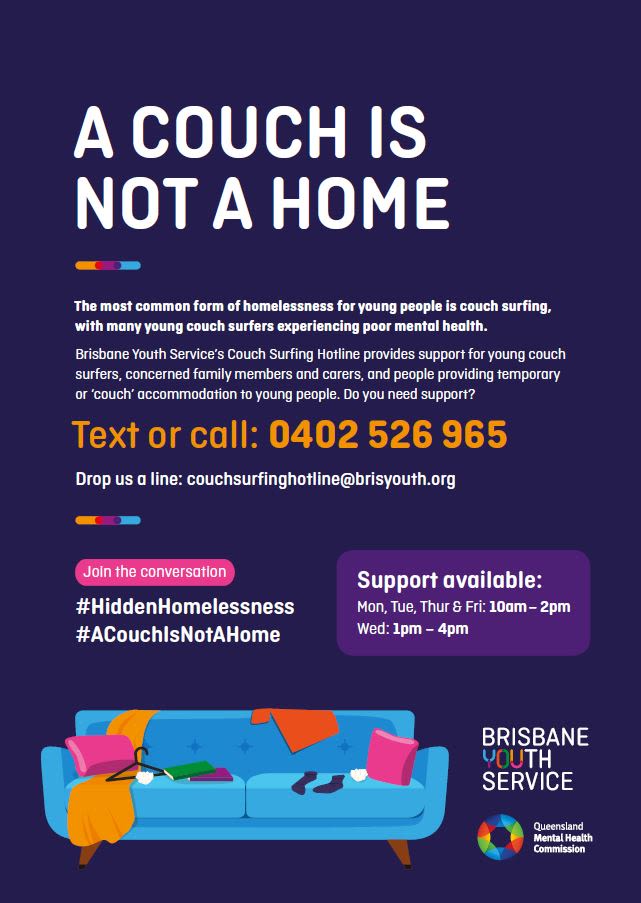Tackling homelessness one text at a time
Couch surfing is the most common form of homelessness for young people.

Access to safe housing is essential for good mental health, but more than 20,000 people in Queensland are experiencing homelessness. There are many factors that lead to homelessness, and lots of innovative programs and ways to help. The Commission will highlight some of these over the next few months on our Leading reform blog. Read more about the importance of addressing homelessness and its links to mental health in our joint statement with the Human Rights Commission.
Homelessness isn’t just sleeping rough on the streets. It’s a term that also encompasses people who sleep in their cars, are in emergency crisis accommodation, or – for many young homeless people – are sleeping on the couches of friends and family because they don’t have a safe or permanent place to stay.
Research from Brisbane Youth Service (BYS) and Griffith University has found that that young people who are couch surfing report significantly poorer mental health than other young people seeking support from a homelessness service – including those who are sleeping rough.
With assistance from a Queensland Mental Health Commission Better Futures grant, BYS last year launched a trial of a new service approach, the Couch Surfing Hotline and Support Service, which provides support and information for couch surfers and their hosts.
BYS Research and Evaluation Manager Rhianon Vichta said couch surfing as a form of homelessness had all the inherent risks of not having a safe and stable place to call home.
“When homelessness is defined as the absence of a ‘roof’, then couch surfing is considered a secondary form of homelessness,” she said.
“However, a home is much more than just a roof to sleep under. Home represents a sense of stability, safety, belonging and identification. When a young person is couch surfing they often do not have any of these.”
“Moving from place to place; staying temporarily with friends, extended family members, acquaintances or strangers – this means young people are highly dependent on those they are staying with, often lacking safety and privacy and with no clear sense of what the future holds.
“In couch surfing environments, young people can be exposed to high levels of drug use, crime and risky relationships. Young people may be expected to engage in non-consensual sex in exchange for a place to stay, or participate in lifestyles that they are uncomfortable with. Or they can feel like a burden, an outsider, like they have nowhere that they belong.
“ This puts young people under high levels of psychological stress and can expose them to physical, sexual, financial and emotional exploitation.”
Ms Vichta said the program is an evaluated trial which would generate new tools to identify and address the mental health and environmental risks experienced by young couch surfers.





Couch Surfing Service Coordinator Ratna Beekman said there had been promising outcomes from the trial.
“Outcomes for couch providers and family members have been predominantly focused on reducing stress and conflict by providing a listening ear and validating their concerns; providing a safe space for them to talk, and encouraging them to connect the young people with services,” she said.
“Finding out what services can help and where to refer young people for support has made a significant difference for family members and couch providers.”
BYS has also been able to improve housing for young people using the service and has helped them access support such as Centrelink and essential services such as GPs and counselling.
“Outcomes include both supporting them to move to safer, more stable housing, and stabilising and improving the situations that they are couch surfing in so that they can remain there with reduced mental health stress and other risks,” Ms Beekman said.
“We have also seen great outcomes in linking young people with the relevant supports that they need and that will be able to support them longer term, such as social groups and local community services.”
The program’s risk-assessment tool has helped couch surfers and service providers identify the risks associated with couch surfing – something that the earlier study undertaken by BYS and Griffith University showed was misunderstood.
“Our research highlighted that youth homelessness services sometimes assume that couch surfing is a safer or preferable option than other forms of homelessness, but that’s not necessarily the case,” Ms Vichta said.
“We are continuing to learn from young people about their couch surfing through our experience providing this service and through our ongoing research interviews. We hope to be able to share our learnings with the youth and homelessness sectors to build stronger understanding of mental health issues and other risks often associated with couch surfing, including increased awareness of how to assess and respond to those risks effectively.”
Ms Vichta encouraged couch surfers and their hosts or concerned family members to get in touch. The hotline (0402 526 965) is staffed from 10am-2pm Monday to Friday and 1pm-4pm Wednesday, and includes a message and call-back service.
“There are supports available – reach out, call, jump online, have a chat. We get couch surfing stress and we are here to help.”
If I can do it, maybe other people can too.

Lee (a pseudonym) contacted the BYS Couch Surfing Hotline after their employment support worker gave them a flyer on the program.
“I was kicked out where I was staying and had only a few options left to stay at friends, so I thought I’d text the hotline and see what happens,” Lee said.
“I knew of BYS as I was with them for a bit in the past. And they’ve always been really good.”
The hotline team helped Lee navigate essential service providers and receive the right financial support.
“I got my Centrelink sorted, which is good as I have not been with my family for a while and I was on the wrong payment, so that’s all good now,” Lee said.
“And where I am staying now has worked out as well. I’m paying rent and all. I could text that number and got a text back and that was good ’cause I don’t like talking on the phone, so we texted for a long time and I could talk about things that maybe I would not say if I was talking over the phone. And then we met in person, which was better than picking up the phone for me. It made me feel better, as I was really down that day.
“There is help and support. You just have to take that first step, which is really difficult, but if I can do it maybe other people can too. Once you get the support, it is pretty good to have someone to talk to and work on things together.”


Couch Surfing Hotline provides:
- Information
- Advice
- Advocacy
- Referral
- Crisis support
- Face-to-face support
Who can access support?
- Young people aged 12 to 25 years who are couch surfing.
- Concerned parents and family of a young person who is couch surfing
- People providing ‘couch’ or temporary accommodation to a young person
Hotline hours:
Monday, Tuesday, Thursday and Friday: 10am – 2pm. Wednesday: 1pm – 4pm
Contact:
Phone or text: 0402 526 965
Email: couchsurfinghotline@brisyouth.org
Join the conversation: #HiddenHomelessness and #ACouchIsNotAHome.


